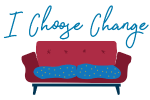You deserve to feel seen, heard, and felt by those you love.
jennifer slingerland ryan
Feel more emotionally connected in relationships, free of addictions, chaos, anxiety, and stress. Live life with more peace and contentment, so you can feel more self-actualized and growth-oriented rather than stagnant.
I get how you feel. I’ve been there.
I’m Dr. Jen, a recovering, anxiously attached person who went from a small-town country girl with low self-esteem to a tree-hugging psychotherapist. I help people strengthen their mental health core with tools for the brain, body, and relationships. I’ve been a therapist for 22 years. I returned to graduate school when I realized my soul could never survive the corporate world (which is where most of my clients hail from).
I’m an attachment-based and Cognitive-Behavioral Therapist (CBT), and I love, love Attachment Theory. I’ve got a passion for helping people receive quality mental health care. As a result, I founded I Choose Change 17 years ago and the Self Love Hub three years ago.
The Fine Print
Treating:
- Individual Counseling: Adults and Couples | FEE: $195 for a 50-minute session | INSURANCE: N/A
- Couples Intensives: 6, 8, 12-hours of couples therapy in one day (click here)
- Relationship Assessments: Find out the state of your relationship (click here)
Fee: $195 for a 50-minute session
Insurance: N/A
Licensed Professional Counselor in Texas and Florida (Telehealth) | Jennifer M. Ryan #19003
Texas Department of State Health Services | Florida Department of State Health Services
Everyone deserves access to quality mental health care.
What do you need today?
EXISTING CLIENTS:
Manage Schedule
Make Appointment
Self Love Hub
The Happiness Handbook
CONTACT:
(214) 547-1318
info@ichoosechange.com





